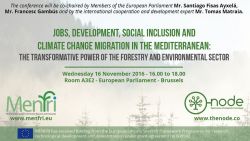Jobs, Development, Social Inclusion & Climate Change Migration in the Mediterranean: The Transformative Power of the Forestry and Environmental Sector

Climate change is no different case, and while it is affecting the entire Mediterranean basin, different land use changes, policy approach and social contexts all result in diverse consequences across the Region. In European countries, land abandonment results in forests which are new but not managed, which means that they are prone to fire and infestation due to increasing temperatures and drought, all of which have social and economic repercussions. Meanwhile, in North Africa, forest intensification combined with a hotter and dryer climate provokes desertification, impacting also on migration and local development capacities.
The MENFRI project has worked to promote innovative Mediterranean forest management and conservation through forest use by sharing knowledge between the northern and southern Mediterranean. Traditional uses of forests from the Maghreb are sources of eco-innovation, which can promote the management of new European forests. Meanwhile, land use practices from southern European countries can decrease forest intensification, leading to a more sustainable use of the forest. In both cases this approach could lead to potential creation of jobs, sustainable development and social progress.
One of the results of the project is the establishment of the Mediterranean Network of Forest Research & Innovation. The Network has successfully expanded and has led to the formation of an external group of key actors from different sectors, all of which have joined forces and have created an independent service-hub called the Node. The NODE - Node for Opportunities, Development and Environment - uses a multidisciplinary approach combining policy advisory capacities with market opportunities, knowledge, training and people’s empowerment in order to provide tailored sustainable development solutions in the forestry and environmental sector. The Node stands ready to support EU and International Organisations so that they may achieve their objectives.
The Conference will gather representatives of the EU Institutions, UfM, United Nations agencies, national authorities, academia, private sector and civil society.
To discover the programme and register to the event, visit our website : www.menfri.eu
Keywords
Forestry, cooperation, mediterranean, jobs, developement


